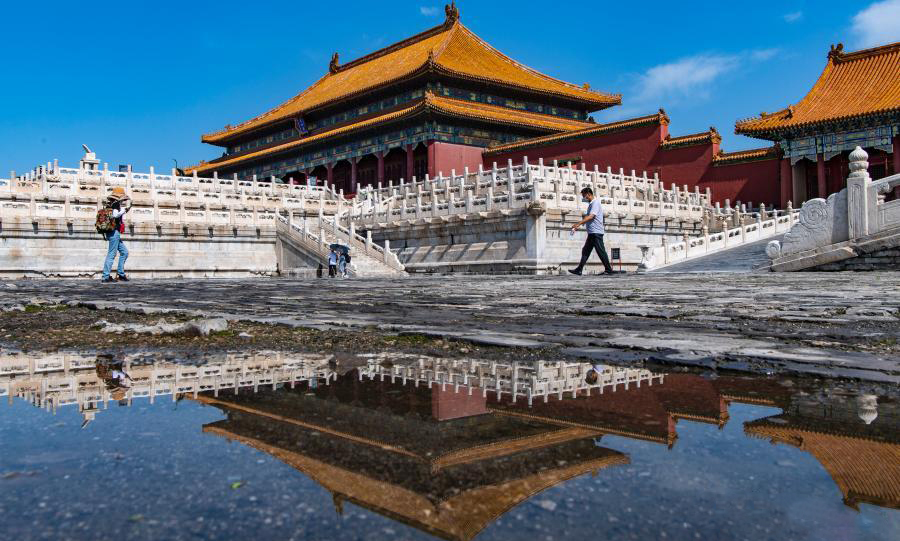China secures economic growth while mitigating epidemic impact
BEIJING, July 20 (Xinhua) -- By effectively coordinating epidemic prevention and control with economic and social development, China has ensured positive economic growth so far this year, mitigating the impacts of COVID-19 outbreaks at home and complex international situations.
The number of daily civil aviation flights since the beginning of July has exceeded 10,000 and cross-provincial tourism in many parts of the country is resuming rapidly.
Electricity consumption in Shanghai hit a record high on July 8, roughly a month after the city fully resumed the normal order of production and living. Starting July 12, Beijing resumed offline sporting events in an orderly manner.
Containing the highly infectious Omicron variant and ensuring public well-being while maintaining economic development momentum is no easy task.
In late May, the State Council rolled out 33 measures in six areas to bring the economy back on a normal track. Some taxes and fees were scrapped or deferred to reduce the burden on businesses, digital coupons were given to residents to encourage consumption, and job creation was boosted to maintain employment stability.
More than 11.51 million new market entities were established nationwide from January to May, of which nearly 8.06 million are individual businesses.
An index tracking the country's logistics market performance stood at 52.1 percent in June, climbing above the boom-bust line of 50 percent for the first time after staying in the contraction zone for three months, according to the China Federation of Logistics &Purchasing (CFLP).
The improving data showed that businesses at both supply and demand sides tended to be more active, according to CFLP.
"In the face of the impact of domestic and overseas periodic and unexpected factors, the Chinese economy has stabilized and rebounded in a relatively short period of time, demonstrating its strong resilience and huge potential," Yuan Da, an official with the National Development and Reform Commission, China's top economic planner, told a press conference last week.
Despite multiple challenges at home and abroad, the Chinese government has made employment a top priority in ensuring people's livelihood and deemed it an important underpinning for keeping overall economic performance stable.
New entrants in the labor force reached around 16 million this year. Among them, college graduates amounted to 10.76 million, a historic high.
To boost employment, the government has carried out large-scale internship programs for graduates, held frequent online and offline recruitment events, and expanded employment channels for key groups of job-seekers.
Thanks to the pro-employment policies, China created 6.54 million new jobs in the first half of the year, achieving 59 percent of the annual target.
China's surveyed urban unemployment rate stood at 5.5 percent in June, down from 5.9 percent in May, the latest data from the National Bureau of Statistics (NBS) showed.
In addition to job creation, the government intensified its efforts to address the problems affecting people's lives and to ensure that their basic living needs are met.
From January to May, over 5.6 million jobless people received unemployment benefits totaling 33.4 billion yuan (about 4.95 billion U.S. dollars).
Starting in July, many localities raised the basic pension payments for retirees by 4 percent, which would benefit over 130 million people.
In the face of increasing volatility in the global energy market and rising prices of agricultural products internationally, China has strived to ensure energy and food security.
Efforts have been made to promote the clean and efficient use of coal and increase the storage capacity of crude oil and coal. The construction of large-scale wind power and photovoltaic bases has also been accelerated.
By focusing on ensuring capacity and stabilizing prices, the country has stepped up efforts to withstand large fluctuations in international energy prices.
China currently has ample energy storage and supply despite some regions experiencing relatively tight supply during peak hours due to rapid economic recovery and continuous high temperatures, according to the National Development and Reform Commission.
The government has allocated 30 billion yuan from the central budget to offer subsidies to grain farmers this year and has raised the minimum purchase prices for rice and wheat to ensure stable grain production.
The country's total grain output reached 147.39 million tonnes in the summer harvest, up 1 percent from last year, according to the NBS.
Photos
Related Stories
- Painstaking efforts needed to stabilize overall Chinese economic performance: Premier Li
- China's economy secures positive growth in Q2 despite downward pressure
- Interview: China's economic resilience offers hope for global growth -- BIS general manager
- Stronger policies key to economic growth
- China's night economy lights up streets of cities, showing consumption potential
Copyright © 2022 People's Daily Online. All Rights Reserved.









